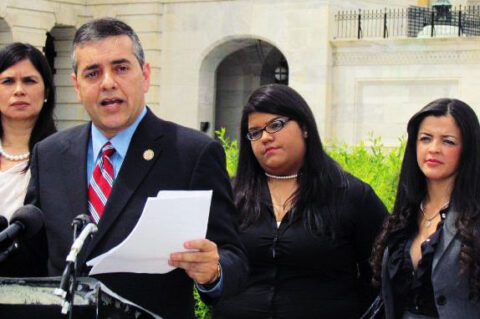Immigration Reform

Updated Figures Highlight Shortfalls of Prosecutorial Discretion Program
As reported in today’s New York Times, the Department of Homeland Security has reviewed nearly 300,000 pending deportation cases over the past seven months in search of low-priority immigrants deserving prosecutorial discretion. While immigrant advocates cheered the policy when it was announced, figures released yesterday suggest that the program is not only falling short of initial expectations, but that the numbers are heading in the wrong direction. Read More

A Comparison of the DREAM Act and Other Proposals for Undocumented Youth
Each year, approximately 65,000 undocumented students graduate from American high schools. While many hope to pursue higher education, join the military, or enter the workforce, their lack of legal status places those dreams in jeopardy and exposes them to deportation. Over the last decade, there has been growing bipartisan consensus that Congress should provide legal immigration status for young adults who came to the country as children and graduated from American high schools. Read More

U.S. Losing High-Skilled Workers to Australia, Canada, and China, Report Says
By Shelby Pasell. “As our competitors press ahead with strategic policies suited to a global century, how much longer can America afford to drift with an immigration regime built in 1965?” This is the question addressed in recent report by the Partnership for a New American Economy and The Partnership for New York City. According to the report, as other countries simplify and expand their immigration programs to attract entrepreneurs and high-skilled workers, the U.S. maintains an old system that makes it difficult for much needed workers to secure a visa. By 2018, the U.S. will face a projected shortfall of 223,800 STEM (Science, Technology, Engineering, and Mathematics) workers, but even for graduates of these programs, visas are limited and there is no secure path towards permanent residency. Read More

STARS Act Highlights Potential Pitfalls of Rubio DREAM Proposal
When news broke yesterday that a Florida congressman introduced an alternative version of the DREAM Act, many assumed it was Sen. Marco Rubio, who has been promising for months to introduce such legislation. In fact, the bill in question—dubbed the STARS Act—was introduced by Rep. David Rivera, a member of the House who introduced similar legislation (the ARMS Act) last January. Although Rivera’s proposals would benefit fewer people than the original DREAM Act, they would put qualified applicants on a path that would ultimately lead to permanent residency. From that perspective, they differ significantly from the proposal Senator Rubio has been discussing, which reportedly does not include a dedicated path to permanent residency. Read More

Law Professors Push White House to Grant Administrative Relief to DREAMers
In the absence of Congressional action on the DREAM Act, advocates and DREAMers have increasingly turned to the White House to help them secure temporary protection from removal. This week, DREAMERS got a huge boost from 96 law professors who sent a letter to President Obama outlining the extensive authority under law that his administration holds to halt deportations of DREAMers. Read More

Standardizing Guidelines Would Improve USCIS’s Proposed Family Unity Waiver Rule
Earlier this year, USCIS proposed a new waiver rule that would allow some unauthorized immigrants (mostly direct family members of U.S. citizens) who are applying for a green card to apply for a waiver to the 3 and 10 year bar from within the United States, minimizing the amount of time they would have to be away from their families. While many welcome this proposed rule change, there are ways in which USCIS could streamline this process. In addition to previously suggested improvements, USCIS could provide training and guidelines on the extreme hardship standard to ensure that the standard is applied consistently. The “comment period,” which is open to the public and can be used to suggest improvements to the rule, end this Friday, June 1. Read More

Still No Resolution on VAWA, Protections for Immigrants at Risk
Despite the recent controversy over amendments to the Violence Against Women Act (VAWA), there is still no resolution on its reauthorization. The bill remains stalled in Congress due to conflicting versions passed by the House and Senate. As one source put it, while the current impasse is technically procedural (due to a revenue-related procedural rule), the source of frustration is certainly political. The House version passed this month strips VAWA of critical protections for immigrants—protections that have been part of the law since its inception. Read More

Expansion of Proposed Waiver Rule Could Help More Families Stay Together
As previously noted, the administration recently proposed a new rule that would help keep American families —the “Proposed Rule on Provisional Unlawful Presence Waivers of Inadmissibility for Certain Immediate Relatives.” This proposed rule would streamline the application process for many relatives of U.S. citizens currently eligible for a green card by minimizing the amount of time that applicants would have to be away from their families before being admitted into the United States. While the proposed rule is certainly a welcome change and would be an improvement over current procedures, there are ways in which the rule could be improved to help even more immigrants. Read More

Michigan Pushes Plan to Welcome Immigrants and their Revitalizing Power to State
While some states pushed for punitive immigration measures over the last year—measures designed to drive immigrants away —others, like those in Michigan, were busy putting together a plan that welcomes immigrants and their revitalizing power to the state. This month, leaders in Michigan—including state Rep. Rashida Tlaib (D-Detroit) and U.S. Rep. Hansen Clarke (D-Detroit)—helped launch “Welcoming Michigan,” a statewide initiative that seeks to welcome immigrants and their entrepreneurial talents to Michigan. Read More

Administration Takes Step Toward More Entrepreneur-Friendly Immigration Policy
BY TEJAS SHAH*. While the U.S. economy continues to recover at a sluggish pace, the administration continues to emphasize immigration reform’s critical role in promoting innovation and entrepreneurship in the U.S. This week, Cecilia Munoz, the Domestic Policy Council Director at the White House, spoke at a forum hosted by The Hamilton Project of the Brookings Institution about the administration’s commitment to immigration reform and easing pathways for foreign investors in the United States. Sadly, however, talented and dynamic foreign entrepreneurs seeking authorization to direct, operate, manage, or work for their investment vehicles often face tedious barriers. Easing these barriers would benefit our economy and enhance our ability to out-compete other countries in the modern global economy. After all, with out foreign entrepreneurs, we wouldn’t have such U.S. companies as Yahoo, Google, and Intel. Read More
Make a contribution
Make a direct impact on the lives of immigrants.
